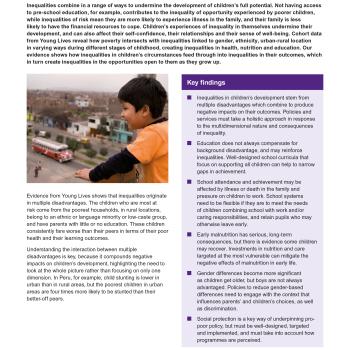Publication Information

Inequalities combine in a range of ways to undermine the development of children’s full potential. Not having access to pre-school education, for example, contributes to the inequality of opportunity experienced by poorer children, while inequalities of risk mean they are more likely to experience illness in the family, and their family is less likely to have the financial resources to cope. Children’s experiences of inequality in themselves undermine their development, and can also affect their self-confidence, their relationships and their sense of well-being. Cohort data from Young Lives reveal how poverty intersects with inequalities linked to gender, ethnicity, urban-rural location in varying ways during different stages of childhood, creating inequalities in health, nutrition and education. Our evidence shows how inequalities in children’s circumstances feed through into inequalities in their outcomes, which in turn create inequalities in the opportunities open to them as they grow up.

Inequalities combine in a range of ways to undermine the development of children’s full potential. Not having access to pre-school education, for example, contributes to the inequality of opportunity experienced by poorer children, while inequalities of risk mean they are more likely to experience illness in the family, and their family is less likely to have the financial resources to cope. Children’s experiences of inequality in themselves undermine their development, and can also affect their self-confidence, their relationships and their sense of well-being. Cohort data from Young Lives reveal how poverty intersects with inequalities linked to gender, ethnicity, urban-rural location in varying ways during different stages of childhood, creating inequalities in health, nutrition and education. Our evidence shows how inequalities in children’s circumstances feed through into inequalities in their outcomes, which in turn create inequalities in the opportunities open to them as they grow up.

